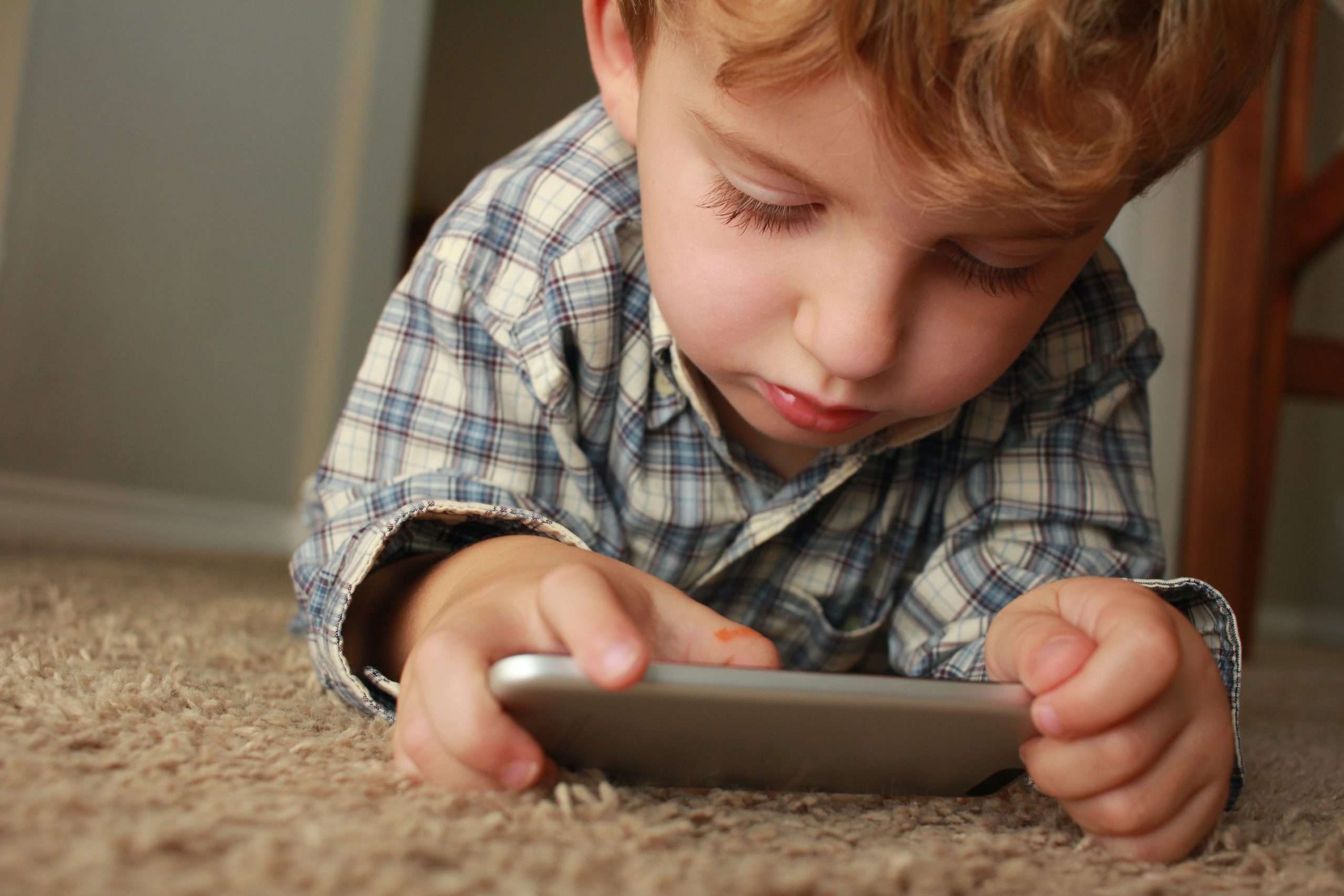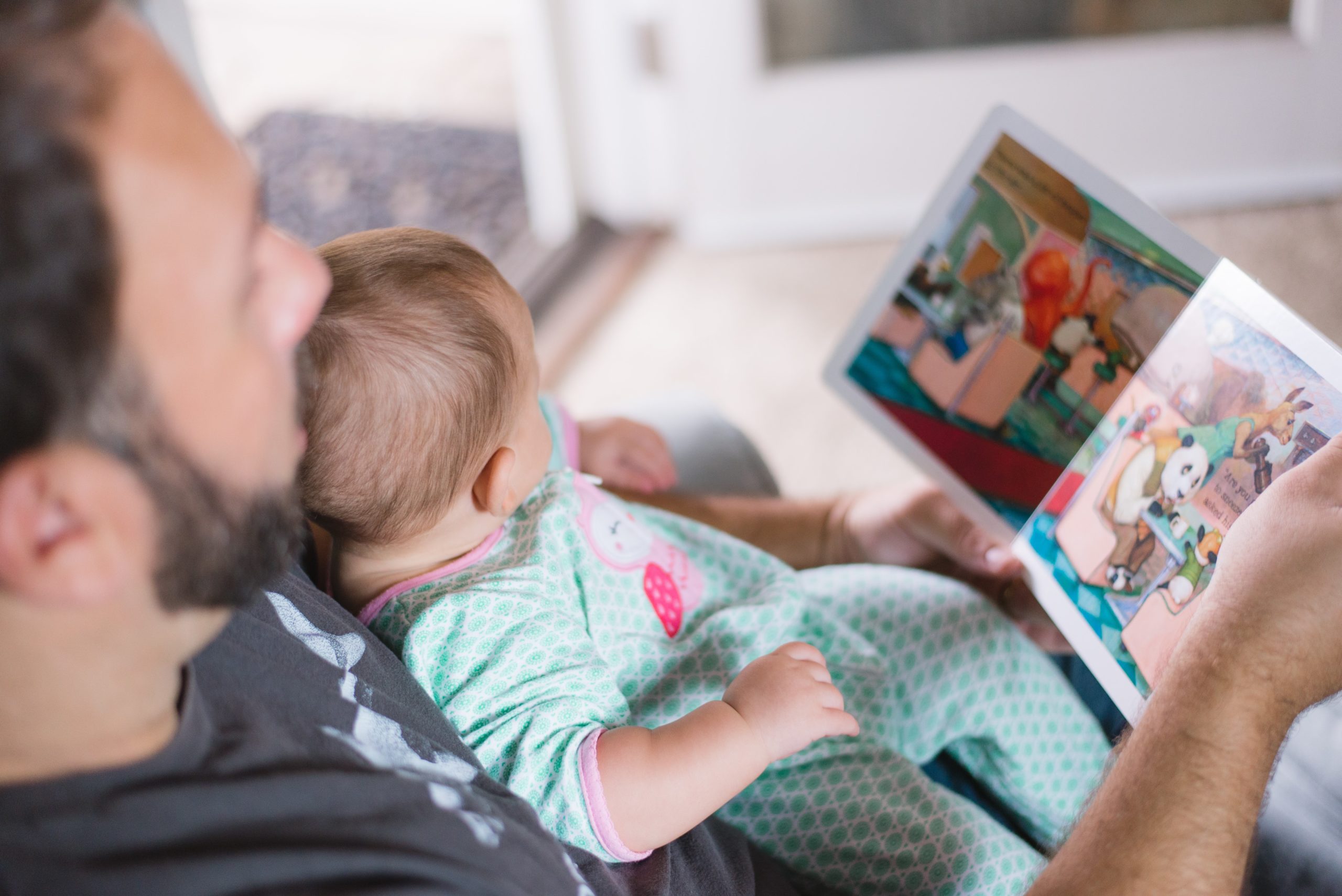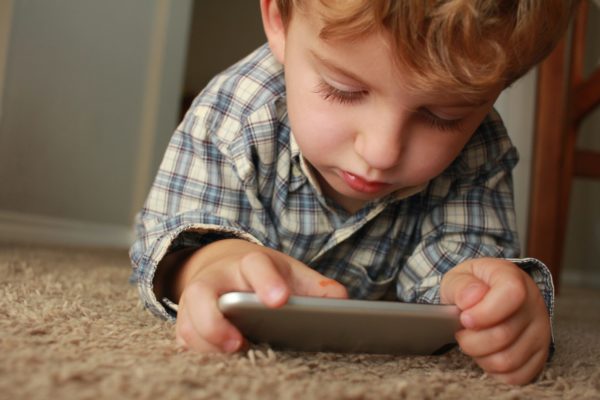I am an expectant first-time grandma with a serious case of baby fever. Any time I’m out in public, my eyes are invariably drawn to babies.

While standing in a customs line in a large international airport recently, I spied a baby in a stroller: a precious little girl, her baby-fine hair pulled into a tiny sticking-straight-up ponytail, snugly tucked in with a well-loved blanky and sucking blithely on her pacifier. The picture of contentment.
Instead of taking in the myriad sights and sounds in the bustling airport though, the baby was looking down.
As the family passed by, I saw it: clutched in her chubby little hands was a smartphone. The last thing I saw her do as they exited my line of vision was reach down, locate and retrieve the pacifier that had fallen out of her mouth, and deftly replace it – all without breaking her gaze from the screen.

That’s not the first time I’ve seen a baby fixated on a screen; I know you’ve seen it too.
But there was something about that scene that gave me pause. I decided to see what the experts are saying about it. It is something that I have been wondering and worrying about for quite some time: what are the effects of screens on the developing brain?
During my research, three common areas of concern emerged:
The habit of relying on screens
In 1999, the American Academy of Pediatrics (AAP) made their first recommendations on screen time for children under two years old. The reference to screens, of course, meant TV time. Research on the effects of TV watching on the developing brain was incomplete at the time, but it seems the AAP was working on the sneaking suspicion that “there were more potential negative effects than positive effects of media exposure for the younger set.”
What was their recommendation for screen time for children under two in 1999?
None. As in zero screen time.
In 2011, roughly five years after the widespread advent of smartphones and only a year after tablets became widely available; the AAP revisited the topic and conceded that it’s increasingly difficult to keep young children away from screens. In the same article referenced above, they state:
The temptation to rely on media screens to entertain babies and toddlers is more appealing than ever, with screens surrounding families at home, in the car, and even at the grocery store. And there is no shortage of media products and programming targeted to little ones.
In a survey of parents conducted during this new study, the AAP found that ninety percent of parents said their children under age two watch some form of electronic media for an average of 1-2 hours a day. By age three, almost one-third of children have a television in their bedroom.
Despite these trends, the AAP, even today, stands by its recommendation “to keep children under age 2 as “screen-free” as possible.” The 2011 policy statement goes on to say: “More is known today about children’s early brain development, the best ways to help them learn, and the effects that various types of stimulation and activities have on this process.”
Developmental Delays
It is widely accepted that the first three years of life are the most important of a child’s development: it’s a time of tremendous physical, intellectual, and social-emotional growth.
In the same 2011 study, the AAP found that more screen time is linked to poorer progress on key developmental standards including communication, problem-solving, and social skills. Additionally, media use is associated with higher rates of obesity, sleep problems, aggressive behavior, and attention issues in young children.
More recently, the Cleveland Clinic followed 2,441 children, tracked their development along with screen time from birth to age five, and posted the results in the pediatrics section of their newsletter Health Essentials. Pediatrician Skyler Kalady, MD, who practices at the Cleveland Clinic’s main campus, interpreted the results of the study in this way:
Early exposure to excessive screen time at 24 months was predictive of lower developmental outcomes at 36 months. And similarly, increased screen time exposure at 36 months also was related to decreased developmental outcomes at 60 months.
Dr. Kalady stressed that face to face time for children and parents was vital to a child’s verbal and nonverbal development. Children learn how to interpret facial expressions and body language by seeing other people’s body language and hearing them speak.
What isn’t happening
Anybody who has chased an active toddler around all day doesn’t need an expert to tell them that children learn by doing. From simple things such as how to get along with others, maintain attention span, regulate moods, and modify behavior; to more complex such as resourcefulness, ingenuity, problem-solving, and critical thinking.
All the experts I found agree that children need to have plenty of unstructured playtime. This gives them time to explore their environments and develop motor skills. It also allows children to think creatively and problem solve. Most importantly, children need interaction with other humans; it’s the most vital way they learn and model various skills for development.
Experts have long espoused the importance of eye contact for baby’s behavioral, social, and emotional development, particularly when it comes to parental bonding. The ubiquity of screens has some experts concerned about the impact of the widespread decrease in eye contact and the repercussions they have on developing brains and relationships.
Dr. Mary Aiken, a cyberpsychologist, got to wondering about the impact of decreased eye contact after observing a mother on a train go through an entire feeding without once making eye contact with her baby. In an October 2016 article titled, “Put Down the Mobile Phone: Babies Need Real-life Face Time,” Dr. Aiken describes her observation:
I couldn’t help but wonder how many millions of mums and dads around the world were no longer looking directly into the eyes of their babies while they were feeding or talking to them.” Dr. Aiken said, “What if that direct eye contact was in fact one-half or one-quarter as much as the days when my generation was raised? How will this seemingly small behavioural shift play out over time? Would a generation of babies be affected? The point is that babies need eye contact – they need face time, and not the app type.
In further research, she theorized that parents may have been led to believe that all stimulation is good for babies. But not all stimulation is the same, and babies need eye contact and non-electronic play. And like the other experts, Dr. Aiken stressed the importance of unstructured, unplugged playtime.
But we live in a digital world…what’s a parent to do?
How is a mom supposed to keep her two-year-old occupied while she steals a few minutes for a much-needed shower? Or navigate the payday lines at the commissary with a restless three-year-old? And what about educational videos – surely those are okay?
Military families are especially dependent on screens to stay connected with family and friends. How do we say no to the child that just wants to see grandma and grandpa on the phone? And during times of social distancing, it is difficult to tell our children not to interact with their friends via technology in lieu of an actual classroom.
Despite the gloom and doom purported in the above studies, it turns out the news is not entirely all bad. The issue of “how much is too much” is a lot like everything else in life: screen time is not a one size fits all situation, and you need to decide what’s right for you and your family.
Sheri Madigan, an assistant professor of psychology at the University of Calgary in Canada, was part of a team that studied over 3000 mothers and children enrolled in a recent study. The team followed young children aged two to five and concluded that yes, there should be strict limits. But they also concluded that not all screen time is harmful.
The way in which children are using TV or computers is also important. Watching with parents or caregivers, for example, can make the experience more engaging and less passive. It can even provide opportunities for learning and social development. “Families can develop healthy media habits,” Dr. Madigan says, “When parents watch with their children, they can point out interesting things and contribute to language skills and learning.”
So screen time or no? It’s up to us, as parents.

We need to decipher the recommendations while doing what is best for our children and their development. All the experts in the world can guide us, but we are the ones living with our children.
Dr. Kalady offers reassuring advice to parents “Just sit down with your child, or chase them around and let them explore their environment,” she says. “When they are quiet, read them a book or play with ‘old school’ toys like blocks and puzzles, toys without electronic parts. This allows children to explore, be curious and learn the best.”
And in the end, rest assured; you are doing a great job.
You are smarter than you think, and you know your child best. The time spent interacting with you, in the simplest of ways, is indeed the best thing for your child because you really are your child’s best and smartest teacher.











